WARNING: this story contains graphic images.
To protect the identity of the deceased, all identifying information (including the date of the autopsy) has been removed from the photographs.
Hidden behind the security guards, an x-ray machine and a staircase is the Douglas County Coroner’s office. It’s nestled deep into the red-brick Robert A. Christensen Justice Center, a modern and imposing building.
The office’s isolated location serves as a reminder of the taboo, shielding the dead from the gaze of the living.
Only in the basement of the office, past the sterile waiting room and office space, can the dead be seen. The windows on the left offer the first glimpses of the autopsy being performed in morgue one.
In the morgue, two women dressed in blue surgical gowns labored around the autopsy station in the middle of the room. Forensic Pathologist Dr. Dawn Holmes stood by a counter, precisely dissecting a liver. Jessica Carlos-Ray, the medicolegal death investigator (MDI), stood over the deceased.
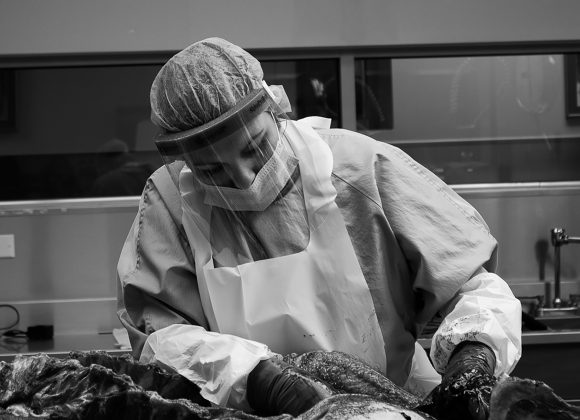
MDI Carlos-Ray examines the deceased during an autopsy at the Douglas County Coroner’s office. (Bri Barnum/CU Independent)
Dr. Holmes and MDI Carlos-Ray are just two members of an increasing population of women flocking to forensics. Antoinette Campbell, the president and founder of the Association of Women in Forensic Science, attributed it to books such as Nancy Drew and women being drawn to problem-solving and critical thinking. Some cite the “CSI effect” and seeing intelligent women practice forensics on television.
But for Jessica Carlos-Ray, becoming a medicolegal death investigator has always made sense.
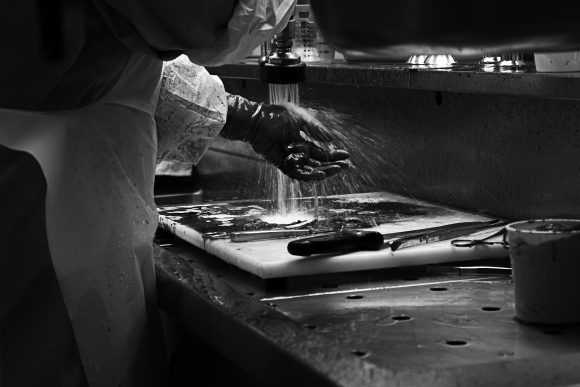
Dr. Holmes washes her hands. (Bri Barnum/CU Independent)
“I find it curious to know what people’s stories are,” Carlos-Ray said, her voice gentle and happy. “I always have liked hearing about people’s lifestyles and their jobs and what they did for their life.”
If life is a story, Carlos-Ray feels akin to an author writing the closing chapter of someone’s life. She helps the deceased’s final story come to light. This action, she says, helps to bring comfort and closure to the families left behind.
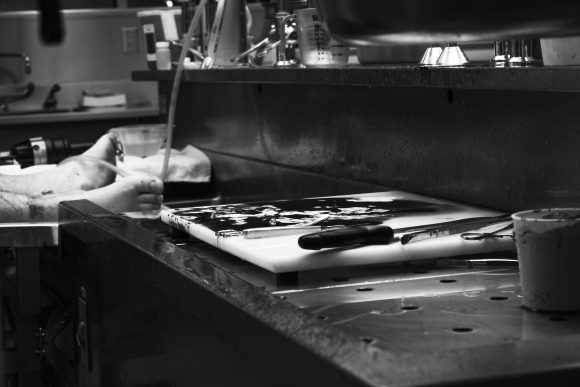
A typical scene in the autopsy room. (Bri Barnum/CU Independent)
Despite the sterile, cold environment and the deceased laid out bare and vulnerable on the table, Carlos-Ray’s compassion was palpable. Though her surgical garb covered most of her face, Carlos-Ray’s eyes remained soft. Even while looking at the deceased, her expression never marred with disgust.
This compassion is something Jill Romann, Douglas County’s coroner, feels is necessary for the field. Every life matters and Romann emphasized hiring those like Carlos-Ray.
“She epitomizes the MDI in that nothing is indifferent to her,” Romann said. “Everything is soul-searched.”
Surrounded by the obviousness of death, Carlos-Ray and the other members of the room talked about life. Images of children and grandchildren were shared, baby names were discussed and the occasional banter would cause Carlos-Ray to let out a laugh. In this room, death was commonplace and a part of her daily routine.
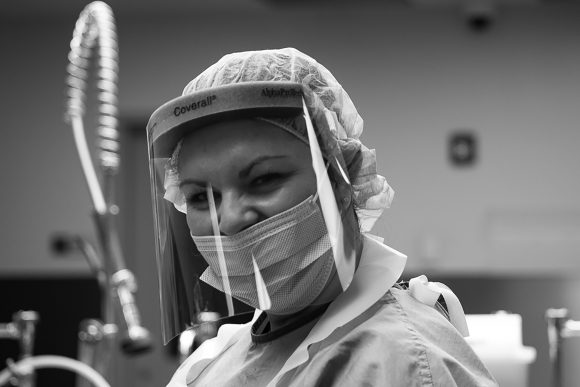
Carlos-Ray pauses to smile at a joke during the autopsy. (Bri Barnum/CU Independent)
But the deceased never drifted far from her thoughts. Carlos-Ray stressed that her compassion was not limited to just the family, the friends and the loved ones. It was for the deceased as well.
During the autopsy, the deceased was the patient and she, the caregiver. Even while the skull cap was removed and the noises of medical instruments filled the air, Carlos-Ray moved with a degree of softness.
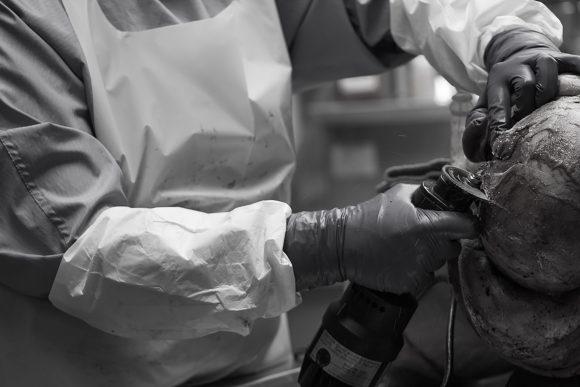
Carlos-Ray uses an electric saw to remove the skull cap during the autopsy. (Bri Barnum/CU Independent)
“[Carlos-Ray] is very unique,” Chief Deputy Coroner Nick Lobello said. “She has the ability to connect on the scene, not only with the family members and the law enforcement and other stakeholders on the scene but with the [deceased].”
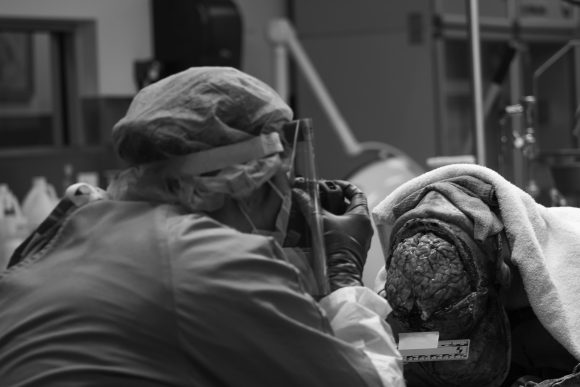
Carlos-Ray photographs the deceased during the autopsy. (Bri Barnum/CU Independent)
While describing Carlos-Ray on the scene, Lobello was nothing but positive.
“You can actually see her taking an interest in wanting to find out exactly what happened to that person so that we can tell their story,” Lobello said.
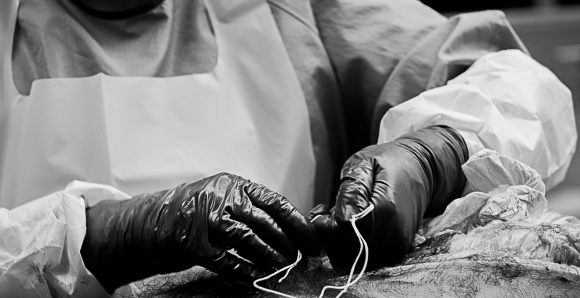
Carlos-Ray sews the deceased closed after the autopsy. (Bri Barnum/CU Independent)
Every day, Carlos-Ray surrounds herself with autopsies and grief. At the end of the day, however, she does not dwell on death. Of course, it is impossible for her to not wonder how her story will end, but Carlos-Ray has learned not to let the inevitability bother her. She instead takes an almost nihilistic approach to her own end.
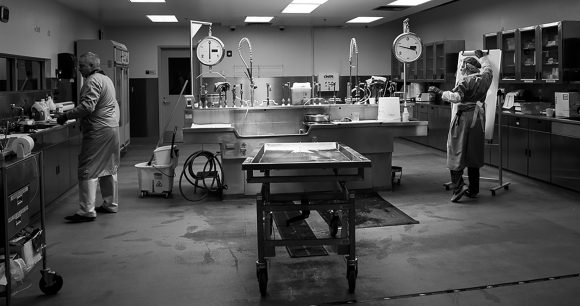
Chief Deputy Coroner Nick Lobello and Carlos-Ray do final clean up after the autopsy. (Bri Barnum/CU Independent)
“If I get in my car tonight and somehow meet my demise, the headache I silently feared all day or the distracting stress of bills yet to be paid won’t have a single matter anyway,” she said with a laugh. “I used to have a tendency to be a hypochondriac. I still do, actually, but after all I have experienced in this profession, I just tell myself that if it’s my time, it’s my time.”

Lobello returns the deceased to the cooler. (Bri Barnum/CU Independent)
Carlos-Ray tries to live without fear or regret, trusting she too will be “awarded with the same care I continually strive to deliver,” she said.
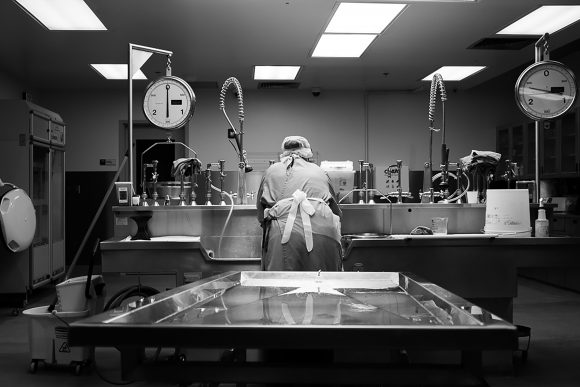
Carlos-Ray cleans and prepares the workstation for the next autopsy. (Bri Barnum/CU Independent)
Contact CU General Assignment News Editor Bri Barnum at brittany.barnum@colorado.edu.

1 comment
[…] The original article may be found at the CU Independent […]
Comments are closed.